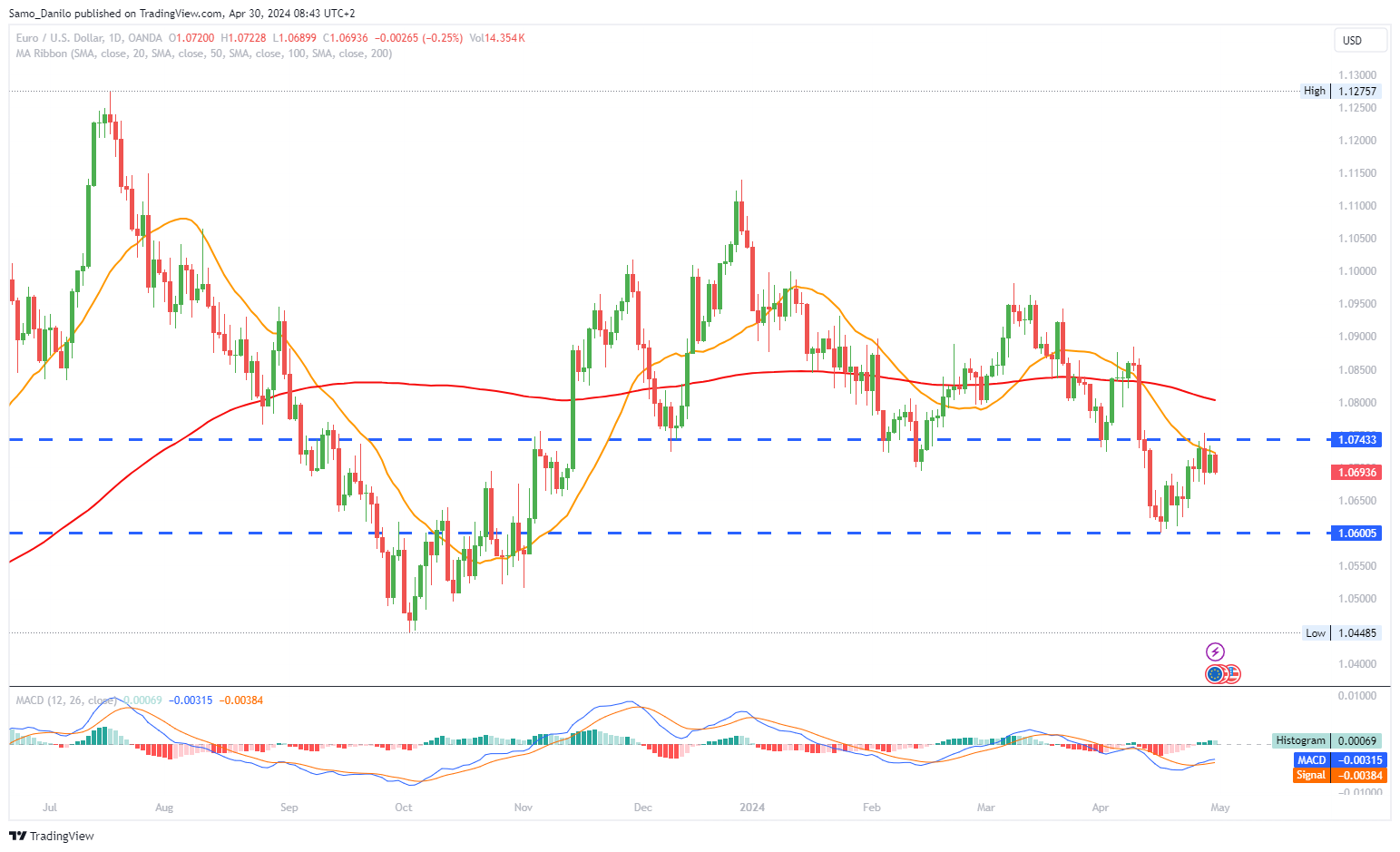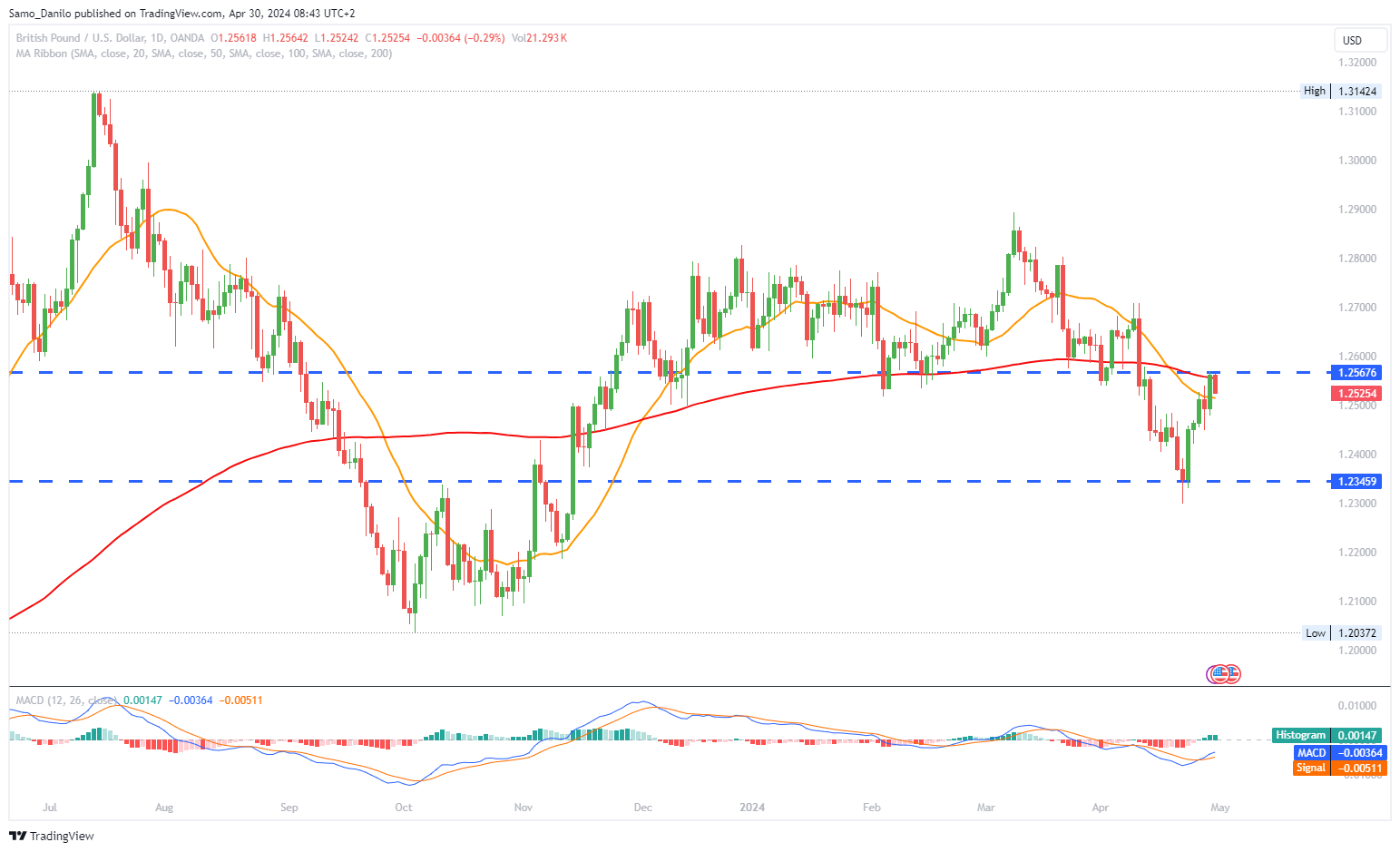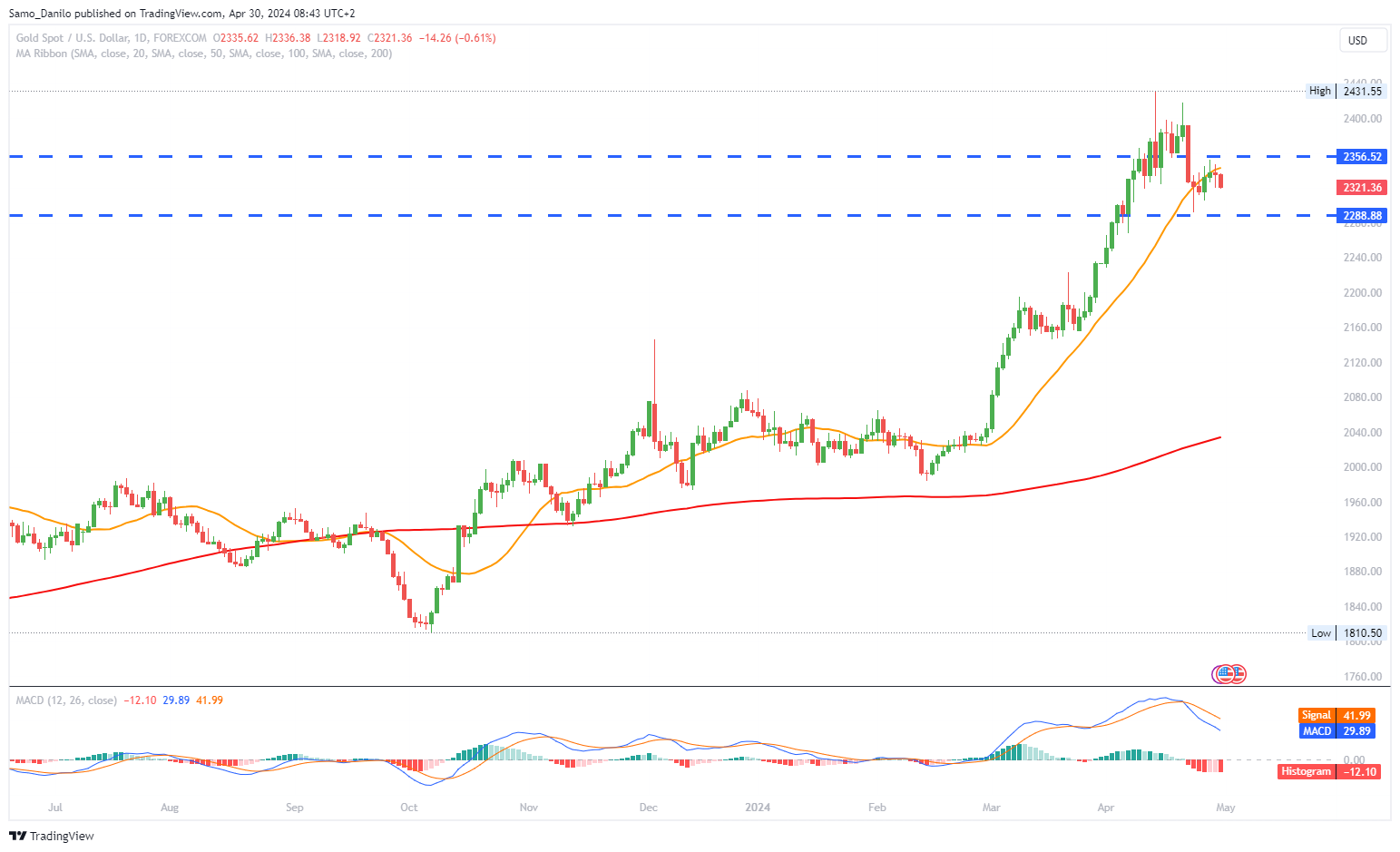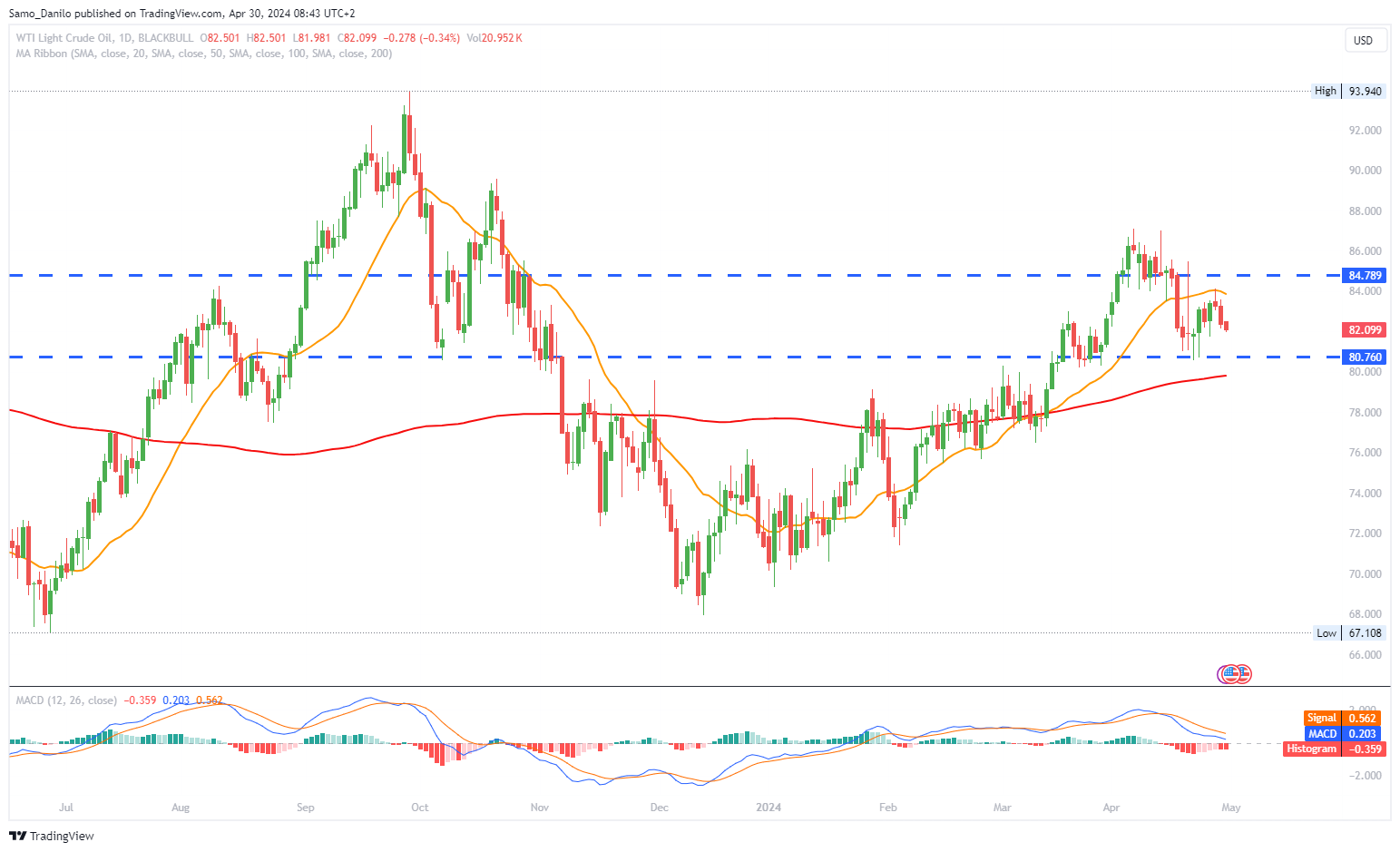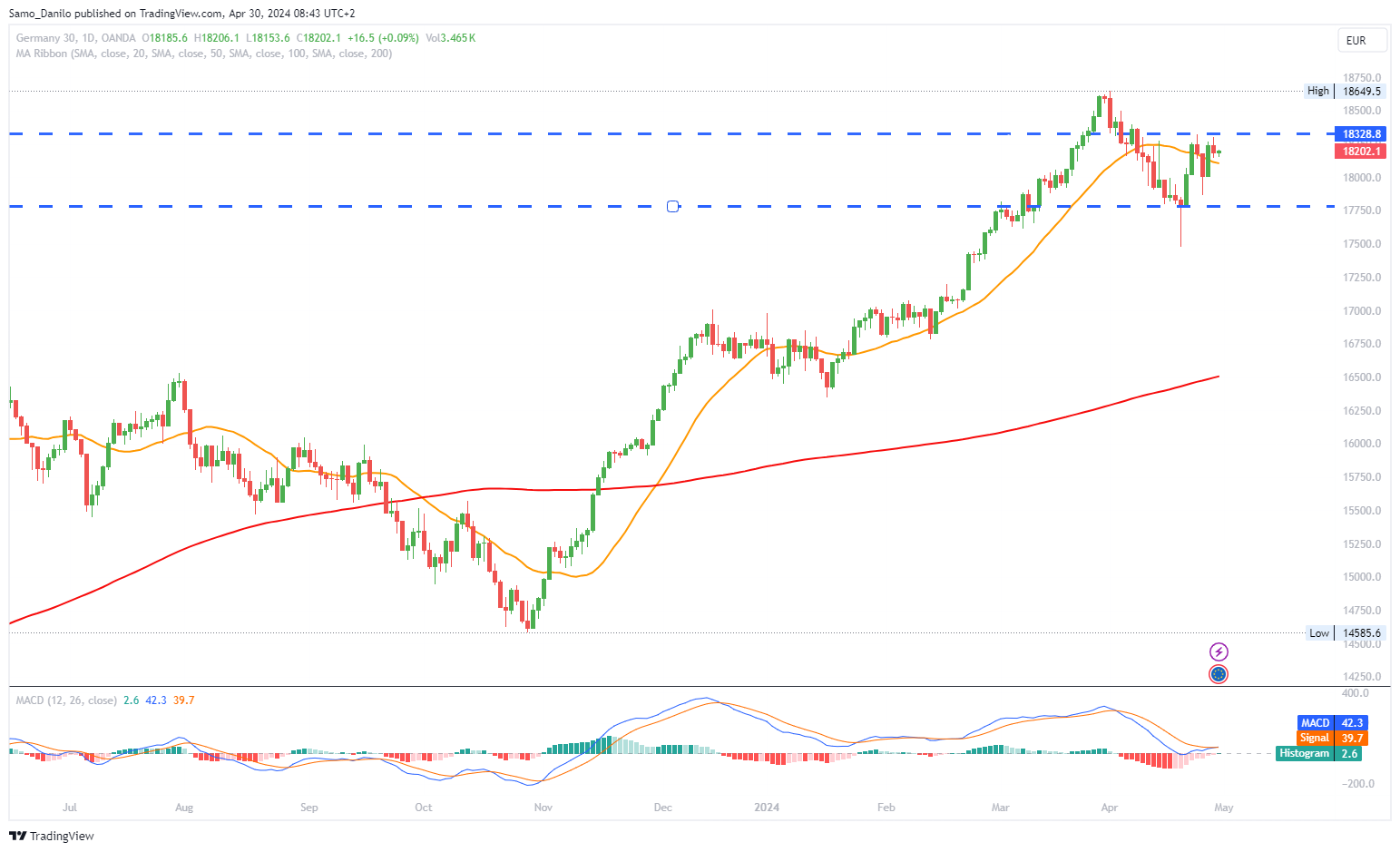EURUSD
- The EUR/USD remains under pressure near 1.0700 due to a rebound in the US Dollar and mixed market sentiment early Tuesday.
- The Dollar's recovery followed suspicious intervention by Japanese authorities in the FX markets, triggered by the Japanese currency's decline to multi-decade lows against the Greenback.
- Despite the Dollar's recent weakness, expectations of a potential interest rate cut by the Federal Reserve later in the year are anticipated to be transitory.
- ECB board members' statements hint at the ECB initiating its easing cycle in June, leading to speculation about three interest rate cuts for the remainder of the year.
- Germany's Retail Sales rebound fails to boost the Euro, with investors awaiting key Eurozone inflation and GDP data releases.
Closing statement: EUR/USD faced downward pressure near 1.0700 amid a rebound in the US Dollar and mixed market sentiment. Despite the Dollar's recent weakness, expectations of a Fed interest rate cut later in the year remained transitory. Statements from ECB board members suggested the ECB might start its easing cycle in June, fuelling speculation about potential interest rate cuts. Germany's Retail Sales rebound failed to boost the Euro, with investors awaiting key Eurozone data releases.
GBPUSD
- GBP/USD is declining towards 1.2500 in European trading on Tuesday, influenced by a cautious risk tone and a notable rebound in the US Dollar.
- The pair faces downward pressure as investors reassess their expectations for Bank of England (BoE) rate cuts, which provides some support to GBP/USD.
- Market participants are focusing on the upcoming Federal Reserve (Fed) monetary policy decisions on Wednesday, followed by the release of the US Bureau of Labor Statistics' April jobs report later in the week.
- Recent US GDP growth and higher-than-expected inflation data might prompt the Fed to maintain higher interest rates for a longer period to ensure inflation moves towards the central bank's target of 2%.
- The combination of cautious market sentiment, a stronger US Dollar, and upcoming economic data releases are driving the direction of GBP/USD.
| SMA (20) | Falling |
|
|
| RSI (14) | Rising |
|
|
| MACD (12, 26, 9) | Rising |
|
|
Closing statement: GBP/USD extended losses towards 1.2500 amid a cautious risk tone and a notable rebound in the US Dollar. Investors reevaluated their expectations for BoE rate cuts, providing some support to the pair. Attention remains on the upcoming Fed monetary policy decisions and the release of the US April jobs report. Recent US economic data, including GDP growth and inflation figures, could influence the Fed's stance on interest rates, impacting GBP/USD further.
GOLD
- Gold price continues its downward trend early Tuesday as traders take profits, contributing to further downside momentum. Technically, gold price closed below the key 21-day Simple Moving Average (SMA) on Monday, indicating a potential bearish signal.
- Decreasing geopolitical tensions, particularly in the Middle East, diminish the appeal of gold as a safe-haven asset, as investors consider the possibility of truce talks.
- Expectations of the Federal Reserve maintaining its recent hawkish stance, fueled by hotter-than-expected US Core Personal Consumption Expenditures (PCE) Price Index inflation data, weigh on gold prices.
- Despite the downward pressure, gold's downside is somewhat cushioned by positive China Manufacturing PMI data for April, which supports demand for the precious metal.
| SMA (20) | Rising |
|
|
| RSI (14) | Falling |
|
|
| MACD (12, 26, 9) | Falling |
|
|
Closing statement: Gold price faces continued downside pressure as traders take profits, with technical indicators showing a bearish signal below the key 21-day Simple Moving Average (SMA). Decreasing geopolitical tensions and expectations of a hawkish stance from the Federal Reserve dampen the appeal of gold as a safe-haven asset. However, positive China Manufacturing PMI data provides some support, mitigating the overall downward momentum.
CRUDE OIL
- WTI prices continue their downward trend for the third consecutive day, hovering near $82.40 on Tuesday.
- The decline in oil prices follows news of ceasefire talks in Cairo, easing concerns about a broader conflict in the Middle East and reducing geopolitical risk premium. Furthermore, recent US inflation data and the hawkish stance from the US Federal Reserve (Fed) diminish expectations of imminent interest rate cuts, exerting downward pressure on crude oil prices.
- Market attention is focused on the outcome of the two-day Federal Open Market Committee (FOMC) policy meeting scheduled for Wednesday, along with key US macroeconomic data, including the Nonfarm Payrolls (NFP) report.
- Additionally, traders await the release of the API Weekly Crude Oil Stock report for the week ending April 26, which will provide insights into the inventory levels and supply-demand dynamics of crude oil.
| SMA (20) | Rising |
|
|
| RSI (14) | Slightly Falling |
| |
| MACD (12, 26, 9) | Falling |
|
|
Closing statement: WTI crude oil prices remain under pressure for the third consecutive day, influenced by easing geopolitical tensions in the Middle East and reduced expectations of imminent interest rate cuts by the US Federal Reserve. Market focus shifts to the upcoming FOMC policy meeting and key US macroeconomic data releases, alongside the API Weekly Crude Oil Stock report, which will offer further insights into crude oil supply dynamics.
DAX
- German Consumer prices in April rose by 2.2% year-on-year, maintaining the same pace as in March, while Economic Sentiment across the Eurozone declined slightly from 96.2 to 95.6.
- Germany's Retail sales surged by 1.8% month-on-month in March, recovering from a 1.9% decline in February, according to data released by Destatis.
- German Import prices decreased by 3.6% year-on-year in March, as reported by the statistics office.
- Investors are closely watching German unemployment and Q1 2024 GDP numbers on Tuesday, with better-than-expected economic indicators potentially impacting investor expectations regarding post-June ECB interest rate cuts.
- Corporate earnings reports, particularly from major companies such as Volkswagen, Vonovia, MTU Aero, Mercedes Benz Group, Lufthansa, and Adidas, will also influence the DAX index.
| SMA (20) | Slightly Rising |
| |
| RSI (14) | Rising |
|
|
| MACD (12, 26, 9) | Slightly Rising |
|
Closing statement: The DAX index is influenced by a mix of economic indicators and corporate earnings reports. While consumer prices remained steady, Retail Sales in Germany rebounded strongly in March. Investor focus shifts to upcoming economic data releases, particularly German unemployment and Q1 2024 GDP numbers, as well as corporate earnings reports from key companies. These factors will shape investor sentiment and expectations regarding ECB interest rate cuts and further impact the performance of the DAX.
